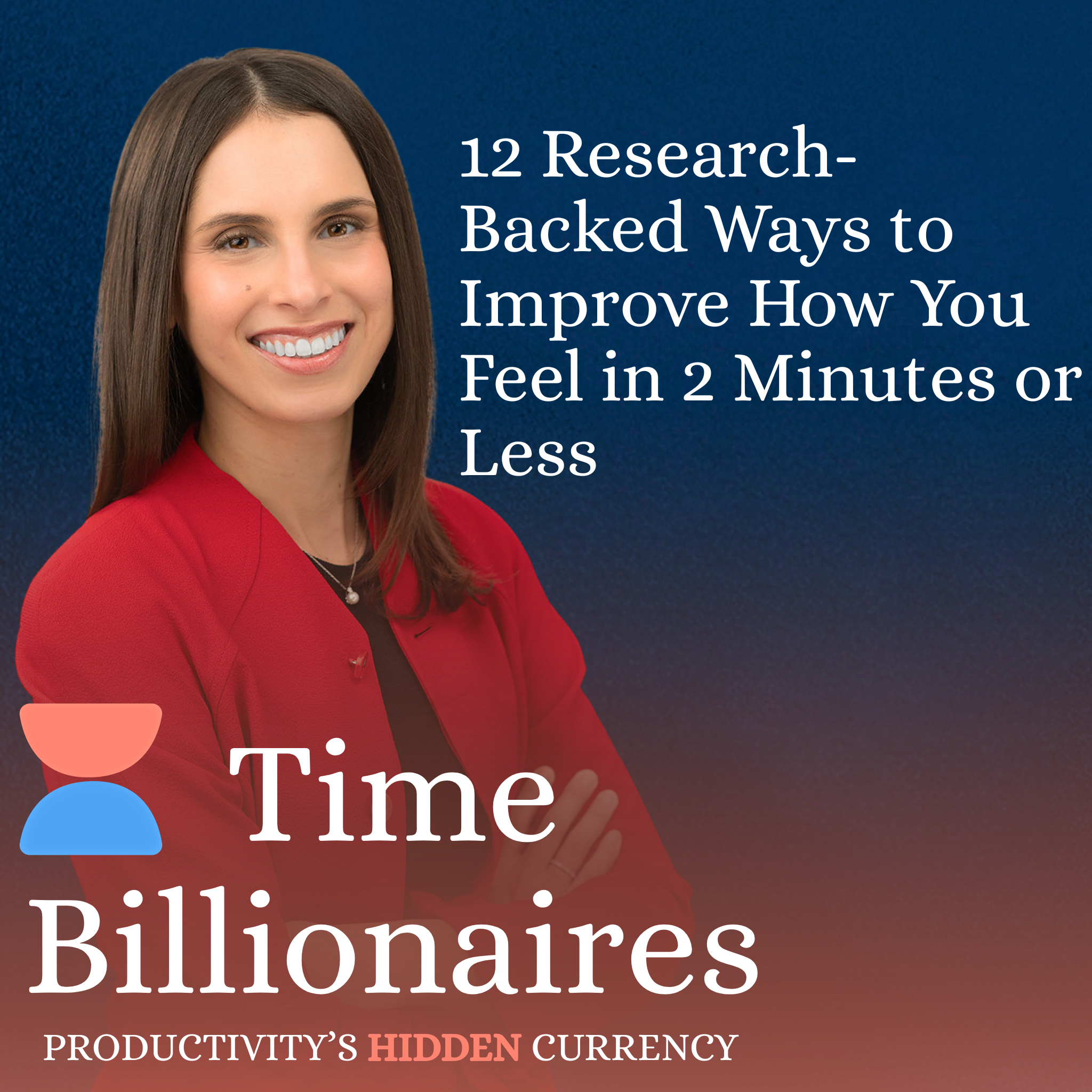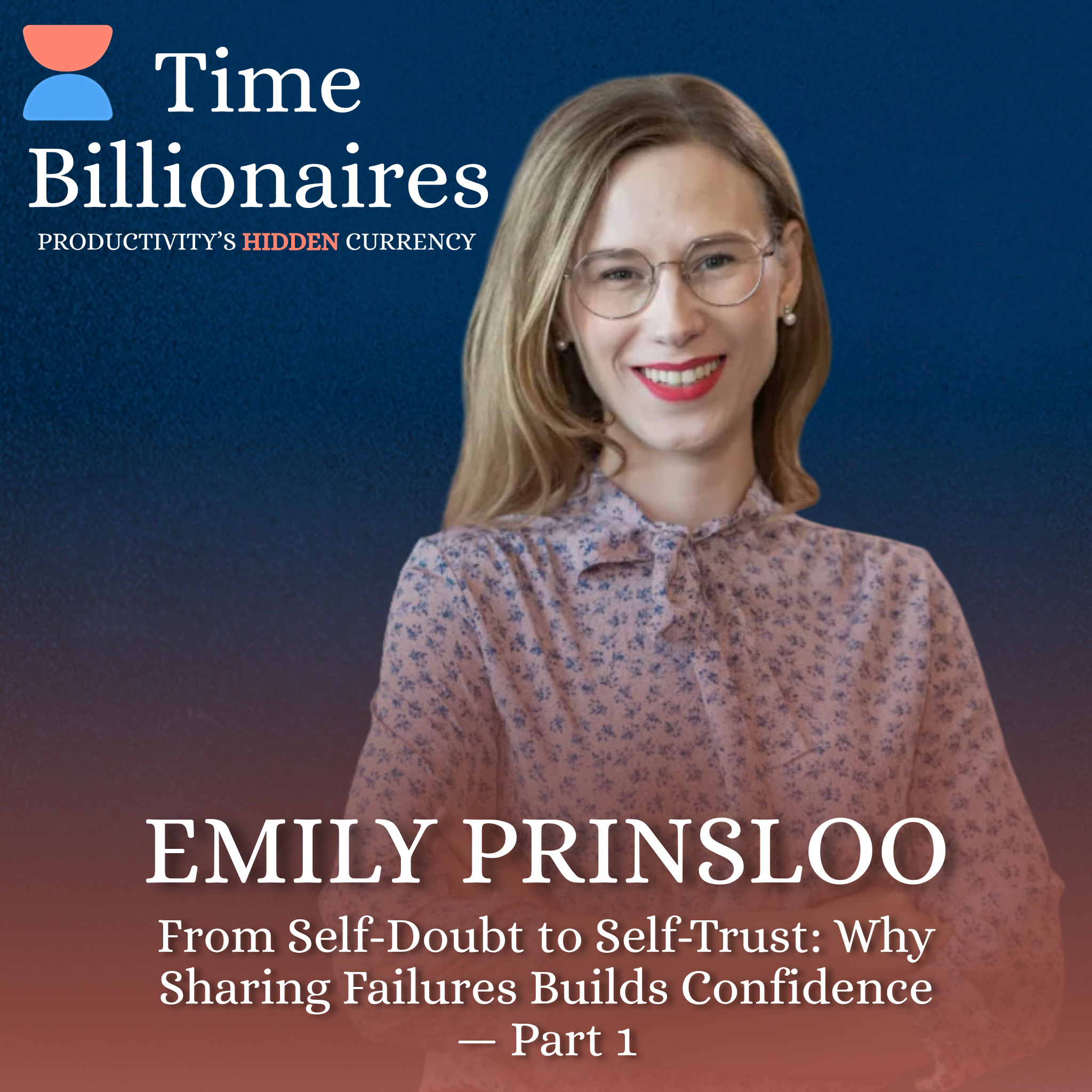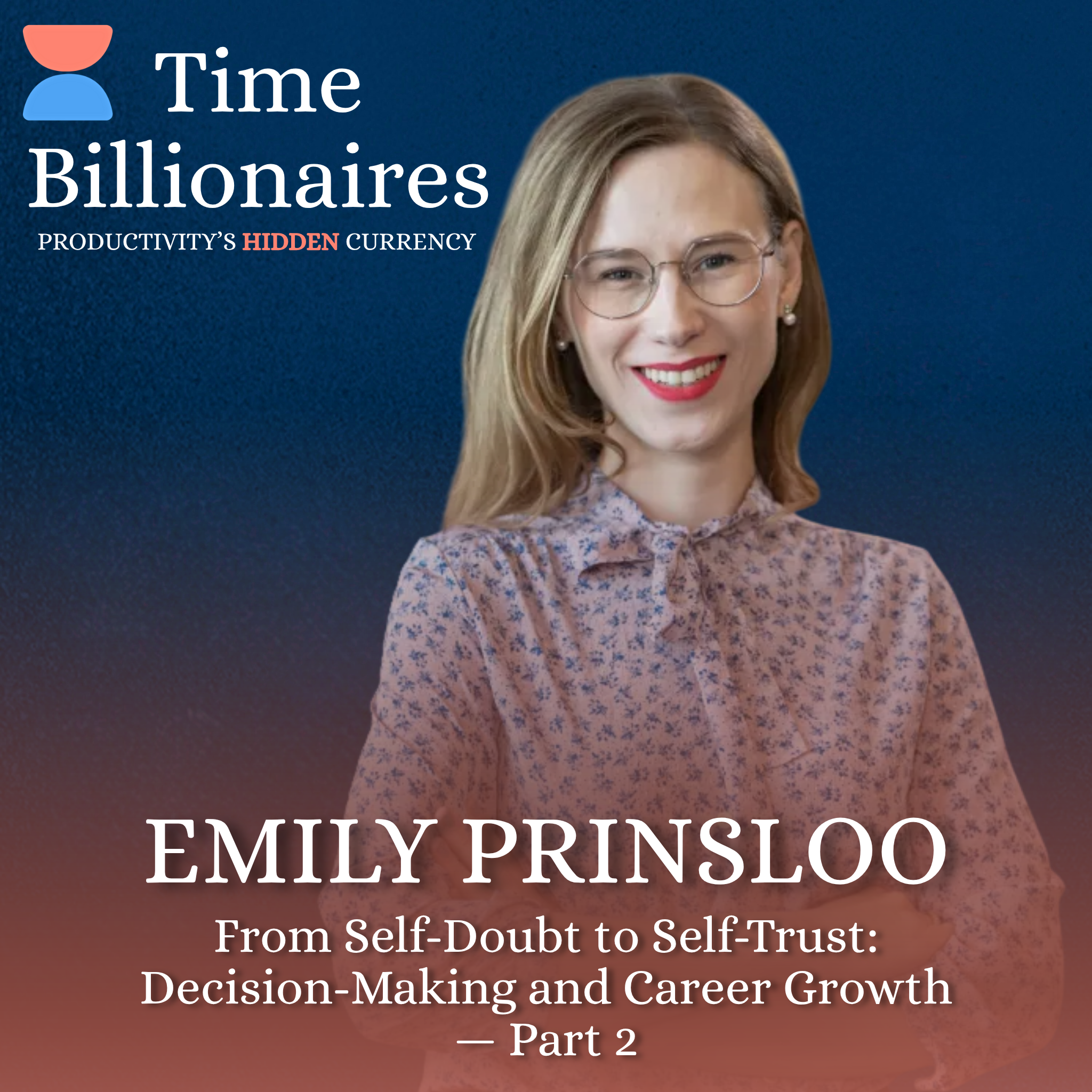Episode Transcript
[00:00:00] Speaker A: Today's episode is about how to build better connections fast and how small mindset shifts can help you do it more often, more easily, and even when you're short on time.
Hey there billionaire.
[00:00:12] Speaker B: Yep, I'm talking to you. If you expect to live another 31 years, you're already a billionaire. Not in money, but in the real.
[00:00:20] Speaker A: Measure of wealth, time.
[00:00:22] Speaker B: That's because 31 years is roughly a billion seconds. But most of us waste time in ways we'd never waste money. The currency of time billionaires is micro moments, the 90 second to 15 minute gaps hidden between the structured parts of your day. This podcast is about reclaiming them with quick, research backed ideas to help you feel more creative, productive and alive. Welcome to Time Billionaires. Let's make your next micro moment count.
[00:00:52] Speaker A: Have you ever wished it were easier to build real, meaningful friendships? Or felt misunderstood, disconnected, or just a little alone?
Maybe you're frustrated by coworkers who rub you the wrong way, or quietly wishing you had more close friends in your corner. You're not alone, and it doesn't have to be this way.
Most people think meaningful connection takes a lot of time. Deep conversations, shared experiences, vulnerability.
But what if connection could actually start in less than a minute?
Today's episode is about how to build better connections fast and how small mindset shifts can help you do it more often, more easily, and even when you're short on time. These kinds of micro connections matter more than we think.
Harvard research, including work done by Emily Prinsloo and colleagues, shows that even brief, casual interactions contribute to our overall sense of belonging and well being.
And when you show up with curiosity, not comparison, these moments multiply.
Let's start with what gets in the way.
How we think about other people fundamentally changes how we relate to them.
If you've ever felt irritated or judged by someone, there's a simple framework to unpack that feeling. It's called join, Jump, or jealous.
When someone's behavior bothers you, it's usually caused by one or a combination of these three things.
Join.
You recognize something in them that reflects a part of yourself that you don't like.
Jump.
You're jumping to conclusions about why they're doing something you wouldn't do.
Jealous. They have something you envy.
Let me give you a quick example.
For most of my career, I've been insecure about looking and sounding younger than I am.
People often underestimated me, and I felt overlooked for opportunities that I knew I could handle. I tended to feel this most acutely at conferences when someone I just Met might quickly dismiss my input and then later seem interested in it when they learned that I was a director at a company with a strong reputation in the industry.
When I was working at a fast growing startup, the company brought on a new sales leader who was basically my opposite. Tall, charismatic, loud, confident, and decades more experienced. He was also friendly enough, and we got along fine at the surface.
But in our weekly revenue leadership meetings, he did things that started to greet me every week without fail. He'd show up five to seven minutes late. The rest of us would already be deep into updates, and then bam. He'd just burst through the door and ask, hey guys, what did I miss? It drove me absolutely nuts, especially because it often happened when I was giving my department's update. And in my head, it felt like he was saying, my time is more valuable than yours. I don't need to play it by the same rules.
After a few months of this, I eventually pulled him aside and asked if he'd be open to some feedback. And to his credit, he said he was. So I basically shared, hey, when you come in late and interrupt these meetings, it really throws off the momentum and feels disrespectful. And his response genuinely surprised me. He apologized and explained that at his last company, there was an overt mandate that people never pretended to understand things they didn't or try to cover up their mistakes. So in his mind, he was owning up to the fact that he was late and didn't want to look like he was pretending he understood things he'd missed or like he was trying to sneak in unnoticed. Plus, he had a meeting on the other side of the office that often ran over right before these leadership meetings, which made it hard for him to avoid being late to this meeting.
And that moment changed everything for me.
I realized that I'd been jumping to conclusions because I couldn't imagine myself ever doing what he did. I assumed the worst, and I'll admit I was definitely jealous of the grace that he seemed to get, the leeway and the confidence that came from having decades of experience and not seeming quite as nervous or prepared as I was for these meetings.
So there it was. Jump and jealous were causing me to view someone's behavior differently than they intended. But once I understood where he was coming from, all of that resentment melted away. We were actually able to push back that start time of the meeting, five minutes, so everyone could arrive on time, and he became someone I knew I could count on to give me real feedback because we'd had this shared connection. So in less than a minute, I'd learned that his behavior wasn't about disrespect and it was about adapting to actually a new culture. And so was mine. So this made me fundamentally interact with him differently in a way that benefited the entirety of our working relationship for years to come.
In general, when we judge others, whether we place ourselves above them or below them, it comes from a feeling of inadequacy. So sometimes we try to boost our confidence by mentally evaluating ourselves above people we feel superior to or don't understand.
But even admiring our heroes is a form of self judgment. So when we see someone that we respect and we think they're amazing, I could never do that. The truth is that judgment simplifies and distorts reality. Either way, whether we put ourselves above or below them, we turn other people's full three dimensional complex lives into simple two dimensional stories that don't capture the full picture.
So this judgment either props us up or puts us down, but either way, it pulls us out of genuine connection and into a place of performance and comparison. And we never thrive by measuring our worth against others.
Judgment distorts how we see others and it limits how we see ourselves.
The more aware we are of the stories we tell ourselves about other people, the more power we have to change them.
But let's talk about another part of this. So let's say even once you let go of judgment, there's still one more hurdle to meaningful connection, which is actually putting yourself out there, starting a conversation, giving a compliment, saying something real. We often call that vulnerability. But I want to offer a reframe. And this realization came a few months ago after I accidentally replaced the word vulnerable with the word bold in a sentence I was writing. I just command feed by accident and the word bold dropped where vulnerable had been. So the sentence if I could be so vulnerable became if I could be so bold, which I thought made it 10 times stronger while still keeping the intent.
So that made me realize that the word vulnerable actually primes us for exposure and potential hurt. It's defensive energy, while the word bold primes us for forward motion. And looking at the upside, it's offensive growth oriented energy. It's the exact same action, but if you describe it with a different word, it has a completely different focus and energy cost. So instead of needing to build up the courage to minimize the downside, when we shift to boldness, we're actually starting to focus on being excited about the potential benefits of the exact same action. So think about it like this. If you were to say I need to be vulnerable with my team, it feels risky. But if you say I'm going to create space for bold honesty with my team, it feels empowering. Which is the exact same motion, essentially.
So the next time you're hesitating to reach out or say something real or start a conversation, try this. Reframe. Just say I'm going to be bold and do it. I promise you. This sounds harder than it is and it comes back to the mindset and empathy we're talking about.
How do you get started?
My dad used to tell me that everyone you'll ever meet in your entire life has something that they can teach you and that your life will be a lot more interesting if you can figure out what that is. And I found this to be absolutely true.
You really don't need a perfect line to start an awesome conversation. You just need curiosity and the willingness to try.
The way I like to think about starting a conversation is just by asking a question that somebody can answer in one sentence and then being primed to ask one or two follow up question questions about something they said.
When we're in passing with someone, my favorite question to ask them when I pass them on the street or on a hike if people have a dog is what their dog's name is. You'd be surprised by how quickly just asking somebody with a dog what their dog's name is actually reveals something interesting about them. Like if someone chooses to name their dog Scout or Galaxy or Opal or Emma, you've gained a glimpse into their personality in just a few seconds.
Depending on the location, you could use questions like this.
Hey, what's your dog's name? Is that a blue heeler? Or just what's the highlight of your day? So far this works in an elevator or in line at a coffee shop. You can even just ask what brought you to whatever city you're in. If you're in an airport or just make an observation about something nearby and see how they react.
This plays out pretty well for me. And here's an example. So I once passed a dog named Irvine while I was walking down the street and Irvine is the name of the city in Southern California. So that immediately prompted me to ask his owner if he was from California. And it turns out he was and we actually went to college pretty close to each other. That was just a 45 second interaction and it still brings me joy to think about it, even though I've never seen Irvine or his owner Brad ever again.
Here's a quick thought experiment that makes it easier to strike up a conversation if you're still not convinced. Let's imagine you're at a party where you don't know anyone. Picture yourself walking up to a stranger to say hello. How do you feel now flip it.
Imagine you're at that same party where you don't know anyone and someone comes up to you to introduce themselves.
How do you feel?
Probably a little relieved, right?
And happy to have someone to talk to. So why assume that the other person would feel any different?
Starting a conversation is simpler than we make it. Here are a few conversation openers you can try Just make an observation about something you seem to have in common. It can be as simple as a color that you're both wearing.
If you're at an event, you can ask them what brought them there, or how they know the host. If it's a work event, you can ask how they decided to go into the industry or field that you're in, what they're most looking forward to there, or what the highlight of the event has been for them so far.
You can just ask what's exciting you lately in pretty much any situation?
Or have you read or learned anything interesting recently? Again, you could be at an event, you could be at a party, you could be in line at the grocery store.
And depending on where you are, you can even just say how long have you been in whatever city you're in?
The trick is, no matter what question you open with, just ask one or two follow up questions about whatever they've responded with. Don't just jump into another unrelated question after that, because if you do, your conversation will just feel disjointed and you're never going to make ground toward a more meaningful connection. It also sounds like you don't really care about what they're saying.
So for example, here's how this plays out. If they say I've been here in Miami for two years, you can ask what brought you here? Or what's something that surprised you about living here? Or where were you before? And look for opportunities to jump off of their answers into something more meaningful.
And if they say that lately they've been excited about going camping with their kids, you can ask about where they're going next, or what trips they have planned, what got them into camping in the first place, or what their kids enjoy most about camping, then you can listen for anything that actually interests you and make a connection. From there.
You can reveal something about yourself to make the connection while keeping the focus on them until they ask you a question about yourself or the conversation naturally evolves. The trick is really just to be in the moment and hear something that you find interesting.
So for example, with a camping trip, if someone were to say they're excited to go camping with their kids, you can listen to it, ask those follow up questions, and then say something like that's awesome. I grew up camping in Yosemite, which is still my favorite place to camp. But I've loved rafting and camping in British Columbia too.
Where's your favorite spot? What do you like about that spot? Maybe I'll check it out. You'd be surprised by how naturally things flow from there if you just stay curious and open.
So here's some things you can try today. Obviously all of the above. But if we want to make this really practical for your next macro moment, here are three very specific things that you can do in just a few minutes.
Use that Join, jump, or Jealous framework. Think of somebody who annoys you, however small. It could be a neighbor, somebody you pass, even how somebody drives and ask yourself whether joined, jump or jealous could be driving your judgment of how you perceive them. And challenge yourself to come up with three alternate explanations for the behavior that annoys you.
Even just one alternate explanation is going to be good.
The second is to find an opportunity to reframe something as boldness instead of vulnerability.
That could mean saying something important that you're holding back and just by thinking about the upside to be gained by revealing something that's important to discuss or rather than the potential downside.
Honestly, I think you can say almost anything if you have the right tone and intention.
And third, you can start a micro connection by just asking somebody a single question or giving them a simple compliment. It could just be as simple as something they're wearing or doing, or appreciating them for holding the door open. Or you could just make a small observation about your surroundings that invites conversation no matter what you do. When you show up with boldness and curiosity, even the smallest moment can build meaningful connections.
[00:13:22] Speaker B: Thanks for spending this micro moment with me.
[00:13:25] Speaker A: If you found it valuable, share it.
[00:13:26] Speaker B: With a fellow time billionaire and give us a rating to help others discover the power of micro moments. For more ways to reclaim your time, check out timebillionaires.org and follow me. Rebecca Shattucks on LinkedIn.
See you next time.


